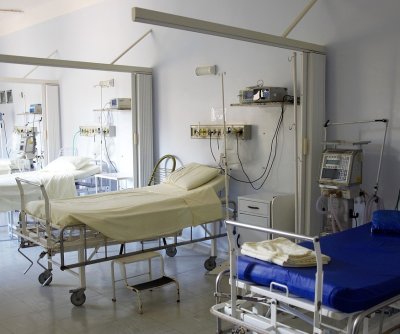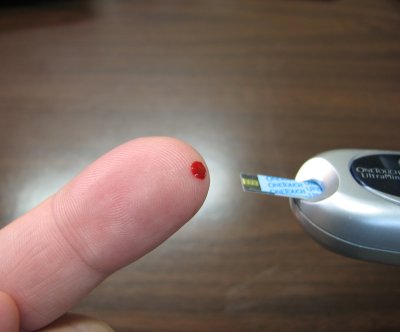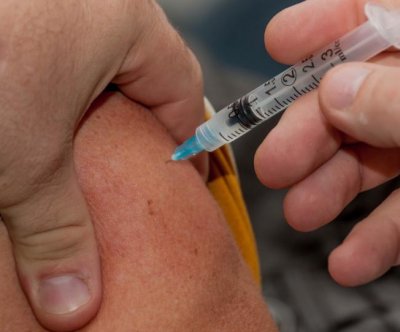
Majority of U.S. kids traveling overseas don't receive measles vaccine
Just over 40 percent of those eligible for the shot actually receive it, despite CDC guidelines urging vaccination.
by Brian P. DunleavyDec. 9 (UPI) -- Less than half of all American children traveling internationally are vaccinated against measles prior to departure, even as many countries across the globe are grappling with ongoing outbreaks of the disease, a new study has found.
In an analysis published Monday in the journal JAMA Pediatrics, researchers reveal that just 41.3 percent of all children 18 years of age and younger received the MMR shot during pre-travel consultations.
The number is somewhat surprising, they said, given that there have been nearly 1,300 cases of measles in the United States so far this year -- with many of them linked to international travel.
"Most people who have been infected with measles during international travel were not vaccinated with MMR prior to departure," study co-author Emily Parker Hyle, an associate professor in the department of infectious diseases at Harvard Medical School, told UPI. "Our study highlights that... almost 60 percent of children who were eligible for vaccination did not receive it at the pre-travel visit due to providers not offering vaccination and guardians refusing it."
Last week, the World Health Organization confirmed that there were nearly 10 million cases of measles globally in 2018.
Currently, the U.S. Centers for Disease Control and Prevention recommends that everyone six months of age and older traveling internationally get vaccinated against measles.
Prior to departure, the agency says, infants between six months and 11 months of age should receive one dose of the MMR vaccine, while children 12 months of age and older should receive two doses of the shot, separated by at least 28 days.
To assess compliance with this guidance, Hyle and her colleagues reviewed the case files of pediatric travelers age six months to 18 years who attended pre-travel health consultations at 29 locations associated with GlobalTravEpiNet, a CDC-supported consortium of facilities that focus on travel medicine services. In all, researchers reviewed nearly 15,000 pre-travel consultations over a 10-year period, of which 2,864 involved travelers eligible to receive the MMR vaccine.
Of the 365 infants in this group, just 204, or 56 percent, received the shot, while only 939 of 2,161, or 43 percent, of preschool aged travelers were given the vaccine. Finally, less than 12 percent of 338 school-aged travelers included in the analysis were administered the two-dose vaccine prior to departure.
The most common reasons for non-vaccination, according to the authors, were clinician decision, in approximately 37 percent of cases, and parent or guardian refusal, in just over 36 percent of cases. Hyle and her colleagues note that although children make up only 10 percent of all foreign travelers in U.S., they account for nearly half of all "imported cases" of measles across the country.
"MMR is a safe and effective vaccine to reduce the risk of infection with measles," Hyle said. "There is enough circulating measles globally and it is so contagious that the CDC doesn't recommend a different vaccination strategy for travelers going to a country with a current outbreak versus a country without a current outbreak."
"Providers should consider MMR vaccination for eligible children who will be traveling internationally, including destinations such as Europe," Hyle said, adding that "parents and guardians should ask their children's pediatricians about MMR vaccination prior to international travel, especially for children ages six months to six years of age."
(0) Leave a comment
upi.com/6965053
Latest Headlines

Health News // 1 hour ago
Timing may be key for SIDS risk, study suggests
Dec. 9 -- New research suggests that a baby's age may offer clues to sudden unexplained infant death, or SUID -- formerly known as SIDS.

Health News // 6 hours ago
Geriatric conditions pose added danger for older heart patients in ICU
Dec. 9 (UPI) -- Common geriatric conditions complicate ICU stays, the American Heart Association says in a new scientific statement, requiring doctors to factor in a mix of treatment needs for older adults.

Health News // 1 day ago
Good workouts might extend a woman's life
If you can tackle a tough workout, that may bode well for your longevity, new research suggests.

Health News // 1 day ago
CBD medicine may help ease another form of seizure
Prescription-grade CBD may help control hard-to-treat seizures caused by a rare genetic disorder, a preliminary study suggests.

Health News // 2 days ago
Clinical trial to test stem cells against type 1 diabetes
Dec. 6 (UPI) -- Researchers believe they may help restore normal immune function in adults with type 1 disease with injections of stem cells, enabling the pancreas to produce insulin.

Health News // 2 days ago
Virtual visits to the doctor good for many with neurological disorders
Dec. 6 -- If you have a neurological disorder, a video chat with your doctor might be as good as an office visit for checking on your condition.

Health News // 2 days ago
BPA levels in humans higher than previously thought, study suggests
Dec. 6 -- Levels of the widely used chemical bisphenol A, or BPA, in people's bodies may be 44 times higher than once thought, according to scientists who say they've created a more accurate way to measure them.

Health News // 2 days ago
FDA testing levels of carcinogens in diabetes drug metformin
Dec. 6 -- Levels of possible cancer-causing chemicals in metformin diabetes medications are under investigation by the U.S. Food and Drug Administration.

Health News // 2 days ago
More than 3,100 new flu cases confirmed by CDC
Dec. 6 (UPI) -- According to the latest FluView report from the Centers for Disease Control and Prevention, released Friday, there were more than 3,100 new cases of the flu confirmed in the U.S. during the week ending Nov. 30.

Health News // 3 days ago
Physicians urge greater focus on role of chronic inflammation in overall health
Dec. 6 (UPI) -- A team of international researchers is calling on physicians to focus more on the diagnosis, prevention and treatment of severe, chronic inflammation, which they say is linked to 50 percent of deaths worldwide.